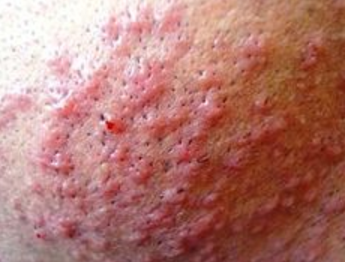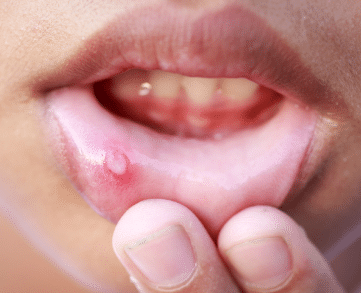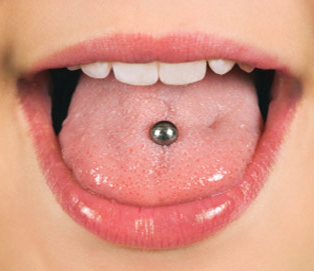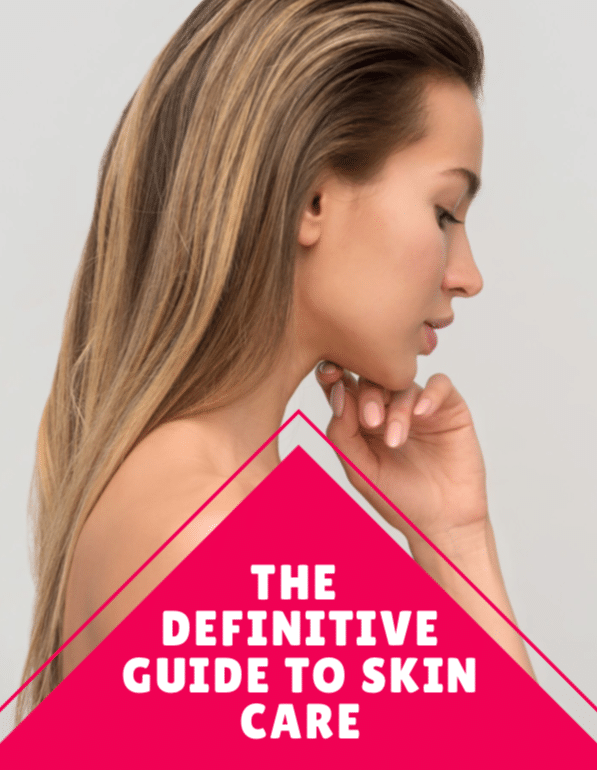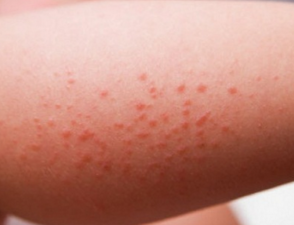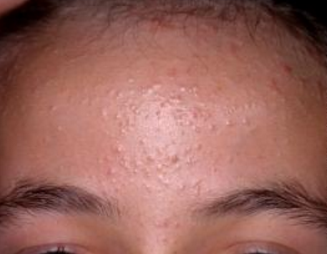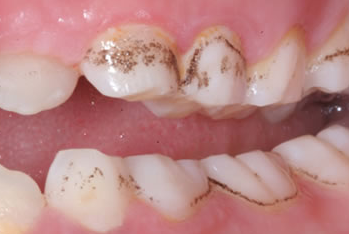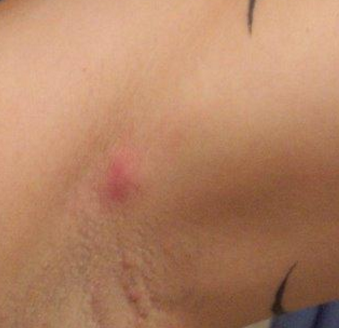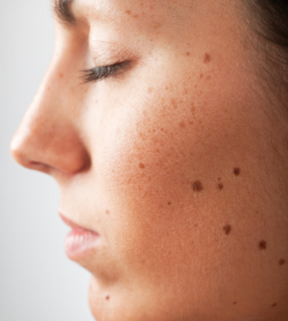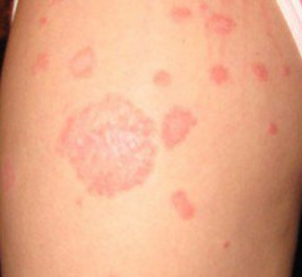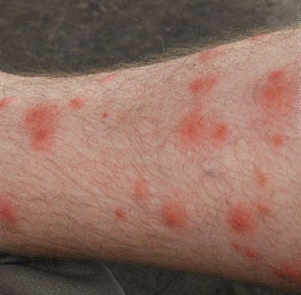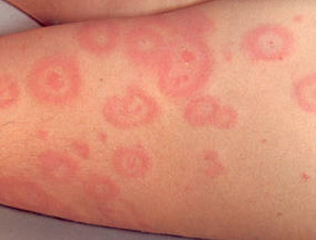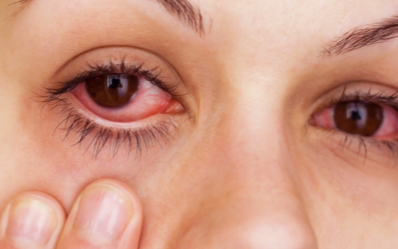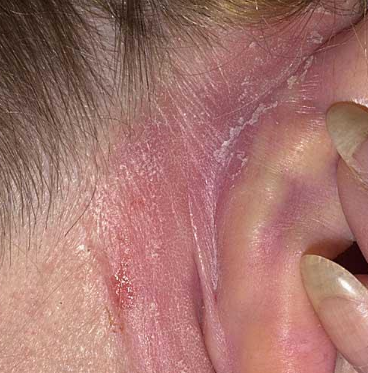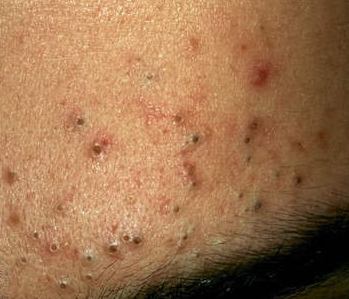What causes scalp sores and scabs? A focus on sores on scalp, painful, itchy, scabs that are oozing as well as how to get rid of them.
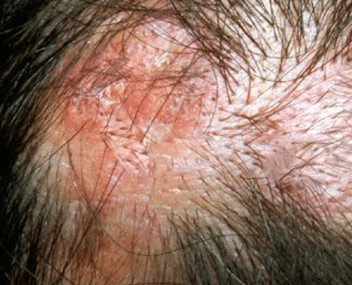
sores on scalp
Sores on Scalp
Sores on scalp can be very itchy, unsightly, as well as very frustrating. Scratching makes them much worse and increases the chances of infection. In most of the cases, scalp scabs will clear up on their own or even with over-the-counter treatments. Most of the time, they don’t show serious illness. If you can’t identify the reason for the scalp scabs, or if they’re spreading or appear infected, see the doctor.
Contact dermatitis is an allergic reaction to something that you’ve touched. Health and the beauty products like a shampoo, or jewelry can lead to an allergic reaction. Some materials, like latex, might also lead to sores on scalp. So can outdoor foliage, like the poison ivy or poison oak. You can also have a bad reaction if toxic substances like the battery acid or even bleach touch the scalp.
An allergic reaction can lead to the scalp to develop dry patches that will itch or burn. If you scratch, you can lead to bleeding and scabbing. The scalp should clear up on its own, but see the doctor if the area appears much infected, is getting more painful, or even spreading. Be careful to avoid coming into contact with any irritant again. Allergic reactions can also grow stronger with many exposures.
Sometimes age is also a factor. Some skin conditions that lead to scalp sores, like the ringworm, primarily affect children. Others, like the pemphigus, primarily affect the older adults .On the other hand, scalp sores may be a result of the pure bad luck — an inherited skin disorder, for instance, can lead to the sores on scalp.
Fortunately, the development of scalp sores can be prevented by proper care. To make sure that the scalp is not prone for an infection, wash the hair regularly and avoid damp or even sweaty skin. Do not share the personal care items like combs and brushes.
Be careful if you have a cut or even scratch on the scalp, because openings in the skin are a prime target for an infection. Also avoid sharing hats or any other type of clothing that can come into contact with the head some scalp conditions are easily passed from one individual to the other
Seborrheic dermatitis is a skin condition that might affect the scalp. Symptoms are itching, flaking, as well as scabbing. Crusty patches of skin are normally white or even yellow and may attach to the hair shaft.
The cause is not very clear, but it has nothing to do with the cleanliness. You can also shampoo the hair every day and still have a dandruff. Even newborn babies may have it. It’s not contagious, and it isn’t usually an indication of poor health. Unfortunately, it may take a longer period to get dandruff under control. In some other cases, it can become a lifelong problem that comes and disappears.
You can also buy over-the-counter medicated shampoos as well as the topical ointments that is designed to treat the dandruff. If that doesn’t assist, then there are some prescription medications that you can try. Some of the drugs can have various side effects, so be sure to follow the package directions carefully. Report any problems to the doctor.
Psoriasis is a skin condition that may be able to affect various parts of the body. It can lead to thick, silver-gray scabs all over the scalp. Mild cases may be treated using medicated shampoo that is designed to treat the scalp and also ease itching.
If that doesn’t assist much, or the condition worsens, see the doctor. Severe cases may require topical or even injectable steroids. If the scalp scabs are accompanied by a swollen lymph nodes, the antimicrobial treatment may also be necessary.
With seborrheic eczema, the scalp becomes much irritated, red, and very scaly. Thick scabs may also become itchy and uncomfortable. The inflammation of the seborrhoeic eczema can make it to spread to the face, neck, and also behind the ears.
In very severe cases, it might also spread to the rest of the body. The cause isn’t established. Eczema may also be treated using medicated shampoos that can assist to loosen scales. Prescription strength topical ointment can also be helpful.
Lichen planus is an ailment that leads to the red or purple bumps on the skin. When it affects the scalp, it’s known as the lichen planopilaris. It can cause permanent scarring as well as hair loss (alopecia).
Anyone is able to get lichen planus, but it’s very likely to strike in the middle age. It might sometimes be diagnosed by the appearance. A skin biopsy is used to confirm the diagnosis. Most of the time, there’s no established cause. It sometimes clears up on its own, but it may persist for many years.
Treatment normally involves topical corticosteroid creams or even oral steroids. In some other cases, injectable steroids can be very helpful. If left untreated, lichen planopilaris can cause hair loss, which might be permanent. Antihistamines can assist with the itching.
Ringworm is a fungal infection that involves the skin, hair shafts, as well as the scalp. Symptoms are itching and scaly patches. Ringworm is likely to involve children and is contagious. Treatment can include oral antifungal medication and also medicated shampoos. Untreated, ringworm can cause extreme inflammation, scarring, and sometimes hair loss that may be permanent
Shingles is brought about by the same virus that leads to chicken pox. After you have chicken pox, the virus remains dormant in the body. If activated, then you get shingles. It affects the skin, but scabs can form on the scalp also.
The shingles rash appears like small blisters that turn yellow in color and form a crust lasting up to about two weeks. A shingles rash can be very painful. It may also lead to headache or even the facial weakness. Symptoms might continue for months. Treatment involves antiviral medication, and topical ointments.
Painful Sores on Scalp
Painful sores, or bumps that develop on the scalp may be brought about by:
- Infection of the hair shafts or the skin
- An allergic skin reaction.
- Viral infections, such as chickenpox and shingles.
- A skin condition, like acne.
- A cyst, like an epidermal or sebaceous cyst, a sac beneath the outer layer of the skin that is filled with a greasy white material. These cysts most often appear on the scalp, ears, back, or scrotum and are brought by plugged ducts at the site of a hair shaft. Other problems might develop if the cyst becomes very infected.
Skin cancer can happen on the scalp, especially in areas not well-covered by hair. It might also destroy skin cells and tissues and, in some other cases, spread to other parts of the body.
Skin cancer can appear as a growth or mole, a sore that does not heal, or irritation of the skin. The three most common types of skin cancer includes basal cell skin cancer, squamous cell skin cancer, and melanoma.
Scabs on Scalp
There are several skin or scalp problems and one of them is the occurrence of scabs on the scalp. This may appear like dandruff, but, it can form very thick crusts that can be so embarrassing. When the scalp is regularly scratched or injured, it will eventually try to heal itself.
When dried cells and blood are mixed, dried cells form a layer known as scab. Scalp scabs may cause itchiness and redness. If not treated, it may also cause abnormal odor. Do not be alarmed if you have sores on scalp because there are possible ways to treat and prevent them. Read on and find out more about this particular condition.
A person who has scabs on scalp must remember that there are many possible causes of this certain condition. Also, it must be noted that it is hard to self-diagnose this condition, that is why you have to consult the doctor first before anything else.
- Eczema – Also called atopic dermatitis, eczema is a skin condition in which thick skin or bumps appear on the skin. The thick skin or bumps can leak fluid. In this particular connection, people who suffer from the eczema normally experience small red or brown colored patches. Due to the superb itchiness, it can lead to scabbing due to excessive scratching.
- Shingles – This particular condition leads to the rashes and blisters on the skin. It a non-threatening viral infection, but it is painful. It can also lead to fatigue, itching, as well as headaches. It is also considered as one of the possible reasons for the scabs on scalp. The moment the rashes and blisters dry up, it would lead to a scab-like appearance on the scalp.
- Oily Scalp – People who have oily scalp are also prone to the scalp scabs. This is due to the fact that the oils can lead to sores on scalp, and other scalp problems with could lead to scalp scabs.
- Scratching – This is potentially the most common reason for the condition. Scalp scabs are formed when the scalp or skin is regularly scratched. Then, it would cause a lesion. The moment it begins to heal, scabs may happen. If you experience itchy skin or even scalp, it is best to consult the doctor about it as perhaps there are other reasons why you are suffering from the condition.
- Psoriasis – It is a skin condition which is brought about by the white blood cells. Sadly, it accidentally attacks the healthy skin cells in the body. The moment the cells build up on the skin surface, it can cause the formation of the thick dandruff-like scales that are red and dry.
Oozing Sores on Scalp
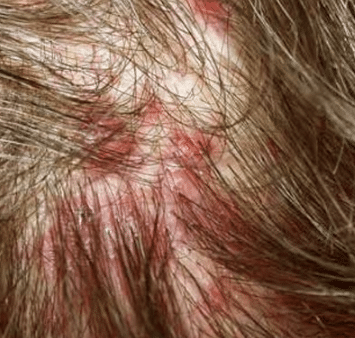
oozing blisters on scalp
Weeping bumps on scalp or any other similar condition happening anywhere on the scalp might be an extremely uncomfortable and harrowing experience. Due to the presence of the dense hair on the scalp, the cutaneous conditions do not get sufficient air and conditions normally worsen due to the accumulation of dirt and sweat around the ulcerous areas.
Especially, if the condition is together with continuous discharge of liquid from the area, it makes things all the more uneasy as the liquid, which is mostly contaminated with infectious agents, gets stuck to the surrounding hair, thus drying up therein and forming into crusts. This makes for an even better breeding ground for the microbes that further infest the sore and surrounding area. All this just makes things very worse for the subject. Painful sores on scalp that weeps a clear or cloudy liquid can be brought about by any of the following conditions:
- Tinea capitis infection, commonly called ringworm, is a fungal infection that is most often responsible for the appearance of the weeping scalp sores. The sores get much bigger when the subject scratches the scalp to get relief from the itchy feel that is followed by ringworm infection.
- Overactive sebaceous glands in the scalp can lead to some serious mischief in the form of scalp acne breakouts, flaking as well as dandruff, all of which cause itching. This normally damages the scalp skin, causing open wounds to turn into painful, weeping sores.
- Bacterial infections brought about by Staphylococcus aureus and Streptococcus pyogenes can often lead to the occurrence of skin sores or lesions. These germs enter the skin through scratches or topical wounds, infecting the wound and making them to seep pus or infected serum.
- Viral skin infections like the chickenpox and shingles leads to the bumps and rashes on the skin that may turn into weeping wounds if in any way scratched or rubbed roughly to ease irritation to the skin.
This and similar conditions might be treated by using natural antiseptics and anti-inflammatory agents like sandalwood paste and turmeric paste, eucalyptus oil, lavender oil, etc. These oils and pastes will not only destroy the bacteria, fungus or yeast that is responsible for the infection but will also soothe the sores and thus relieve the pain, and itchy feeling.
But, these are temporary treatment measures that are effective for imparting of the short-term relief.
In any case, where you notice sore spots on the scalp or any other part of the skin, whether or not they weep, the best action to take is to consult a dermatologist urgently. Strictly follow the medication and treatment course that the dermatologist provides to get complete and effective relief.
Sores Itchy Scalp
Common causes and treatments for itchy sores on scalp:
- Dandruff and seborrheic dermatitis
These are the most common reasons for the itchy scalp.
The body’s inflammatory response to an overgrowth of yeast leads to the itching and flaking associated with these conditions. Yeast usually lives on the scalp and other hairy areas of the body, but the problem arises when there’s a lot of yeast present
For the mild cases, you can use an over-the-counter shampoo that has selenium or zinc pyrithione — which are the ingredients that help to control yeast. For very serious cases, you may require a prescription-strength antifungal shampoo, topical cortisone or even medicated foam, cream or ointment.
- Psoriasis
This is a chronic autoimmune disease that leads to the raised, scaly patches on the skin or scalp. You can’t get psoriasis from other people. Experts don’t have a clear knowledge of what exactly leas to this skin disorder, but a person is more likely to develop it if someone in your family has it.
How to Get Rid of Sores on Scalp – Home Remedies
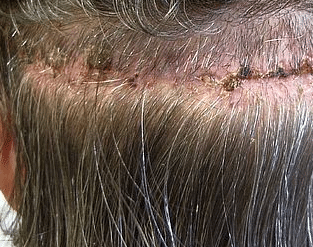
scabs on scalp
- Tea Tree Oil
Use Tea Tree Oil to Get Relief from an Itchy sores on scalp.
Tea tree oil, with its powerful natural antifungal, anti-inflammation and antibacterial properties, can be used to treat itchy scalp. You can use tea tree oil in various ways, for instance:
- You can add 10 to 20 drops of the tea tree oil to one-half cup of baby shampoo and use it daily until the condition of the scalp improves.
- Another option is to dilute about three drops of tea tree oil in one tablespoon of vegetable oil and massage the mixture onto your scalp. With regular use, this remedy will heal a dry, itchy scalp within one week or two.
- Lemon Juice
Lemon juice can help treat an itchy and dry scalp due to its antiseptic properties. It is especially useful when dealing with dandruff.
- You can simply use fresh lemon juice thoroughly on the scalp. Leave it on for about ten minutes and then shampoo the hair. If you do not have a dandruff, dilute the lemon juice in the water.
- Alternately, you can mix the lemon juice with a yogurt and use it on the scalp for a few minutes before washing the hair with a mild shampoo. Repeat the process at least daily until itchiness and dryness disappears.
- Baking Soda
Another readily available ingredient that can is able to relieve an itchy sores on scalp is the baking soda. It assists to relieve itching by exfoliating the scalp and also controlling dandruff brought about by overactive fungi.
- Make a thick paste using baking soda and water and use it directly onto the scalp. For better results, rub some olive oil on your scalp before applying the baking soda paste.
- Allow it to soak into your scalp for about 10 to 15 minutes and then rinse well using water.
- Apple Cider Vinegar
Apple cider vinegar contains a very powerful anti-inflammation properties that assist to kill the yeast and virus that can lead to itchy scalp. Also, apple cider vinegar balances the pH levels of the scalp, which can assist to relieve itching and dryness.
- Rinse the hair and scalp using water and allow it to dry.
- Mix equal amounts of apple cider vinegar and water and then pour the mixture into a spray bottle. Use this mixture directly onto the scalp with the help of cotton balls. Spray it on the scalp.
- After few minutes, shampoo using normal water.
Follow the remedy at least once or twice a week.
- Aloe Vera
Aloe vera gel has moisturizing properties, which can relieve excessive dryness and the itching. If fresh aloe vera gel is not found, you can purchase the gel.
- Spread some fresh aloe vera gel onto the scalp using fingers.
- Allow it to sit for about 10 to 15 minutes and then wash the hair using a mild shampoo.
- Coconut Oil
Coconut oil creates a barrier that assists to keep skin moisturized and therefore it is an effective way to treat an itchy scalp.
- Rub a little coconut oil onto the scalp after washing your hair your scalp when it is clean. Leave it on for at least half an hour and then wash it out with a perfume-free shampoo. Follow this simple remedy three times a week.
- Another option is to gently heat the coconut oil so that it melts, add it to the shampoo before washing the hair.
Further references
- Scalp Scabs: Causes and How to Treat Them: http://www.healthline.com/health/beauty-skin-care/scalp-scabs#Dermatitis2
- Scalp Problems – Topic Overview: http://www.webmd.com/skin-problems-and-treatments/tc/scalp-problems-topic-overview#1

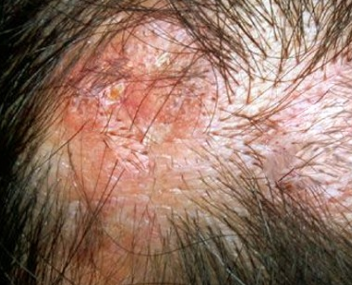
![Red Bumps on Skin [Symptoms & Treatment]](https://lightskincure.org/wp-content/uploads/2017/09/red-bumps-on-skin.png)
